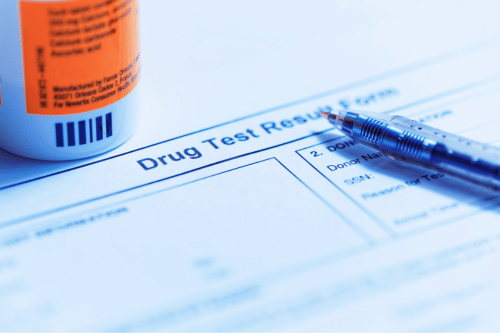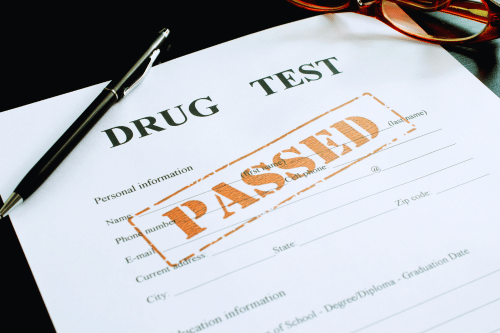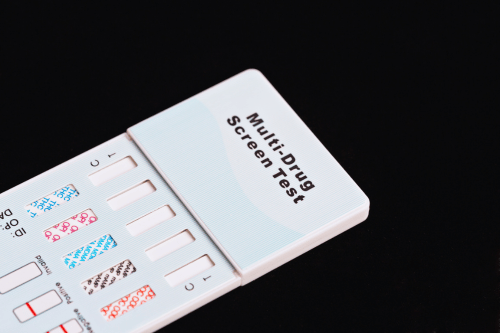

A 10-panel drug test is a type of urine screening used to detect the presence of ten specific drugs in the body. It plays a vital role in workplace testing, medical assessments, legal investigations, and drug treatment programs. At Sullivan Recovery in Mission Viejo, we often use 10-panel drug tests as part of our outpatient monitoring process to ensure accountability during recovery.
A 10-panel drug test screens for ten common prescription and illegal substances. The test is typically administered using a urine sample. This makes it a practical option for both clinical and non-clinical settings, including addiction recovery programs.
This test checks for a mix of prescription medications and illegal drugs that are commonly abused. These include:
Sullivan Recovery uses this panel to monitor drug use in individuals enrolled in our outpatient drug and alcohol treatment program. Regular testing helps identify relapse early and supports long-term sobriety.
Urine is the most common sample type for drug testing due to its ease of collection and quick turnaround time. The collection process is non-invasive and provides accurate detection for recent drug usage. A standard test requires the individual to provide a midstream urine sample, typically 30–60 mL, in a sterile cup.
At Sullivan Recovery, urine testing is conducted in a private and supervised setting to ensure valid results. Supervision prevents sample tampering, while temperature strips and lab verification confirm authenticity. This process helps maintain the integrity of results used in our outpatient drug and alcohol treatment program.
A wide range of employers, healthcare providers, and treatment centers use 10-panel tests. It is especially common in:
Private employers may use it as part of pre-employment screening, random testing, or return-to-duty policies. Legal systems often require it for individuals on probation or involved in custody cases. Physicians may also use the test to evaluate possible drug interactions or substance misuse.
Our team at Sullivan Recovery uses these tests as a tool to support individuals through structured outpatient treatment while maintaining accountability. Drug testing helps track progress, reinforce abstinence, and guide necessary changes in care when relapse indicators appear.

A 5-panel drug test is a simpler version that only checks for five drug types, often focused on illicit drugs. In contrast, the 10-panel test offers a broader detection range that includes more prescription medications. This makes the 10-panel option ideal for recovery programs where prescription drug misuse may be a concern.
Different drugs remain in the urine for varying lengths of time. On average:
These detection windows can vary based on metabolism, frequency of use, and other personal health factors. At Sullivan Recovery, understanding detection times helps us interpret results more accurately within the context of each client’s recovery plan.
Most standard 10-panel drug tests deliver results within 1–3 business days. Negative results often come back faster, sometimes within 24 hours, especially if no further review is needed. Lab-confirmed results go through an internal quality check before release.
If further analysis or Medical Review Officer (MRO) consultation is needed, it may take additional time. This applies when test results are inconclusive or positive and need verification. Delays may also occur if confirmatory testing such as GC/MS (gas chromatography/mass spectrometry) is required.
At Sullivan Recovery, we prioritize fast and accurate testing to support active decision-making during outpatient treatment. Timely results help our clinical team adjust care plans and address concerns without delay.
A positive drug test indicates the presence of one or more substances above the testing threshold. These thresholds are set to avoid false results from trace exposure or passive contact. The presence of a drug metabolite in the urine typically confirms recent use.
In many cases, the result is sent to a Medical Review Officer for evaluation. The MRO contacts the individual to determine whether a legitimate medical explanation, such as a valid prescription, can justify the result. The MRO may request documentation or pharmacy records to complete the review.
In our outpatient setting, we use positive tests to address potential relapse, revisit treatment goals, and adjust the care plan as needed. Our focus is always on accountability and providing additional support when necessary to help clients regain stability.
Yes, false positives can occur due to medications, food products, or supplements. Examples include:
Other substances like antidepressants, antibiotics, or even some over-the-counter pain relievers may also interfere with test results. For this reason, clients should always disclose any medications or supplements they’re taking prior to testing.
That’s why we use MRO review at Sullivan Recovery when necessary, ensuring that clients are treated fairly and accurately based on their test results. This step helps distinguish between legitimate use and potential misuse, promoting a supportive and transparent treatment environment.

Urine testing remains the most popular method due to its speed, cost-effectiveness, and ability to detect recent use. Other methods like hair samples or blood samples may provide longer or more precise detection, but they are often more invasive and expensive.
Sullivan Recovery continues to rely on urine drug testing because it balances accuracy with efficiency, making it ideal for outpatient monitoring.
Standard 10-panel drug tests do not typically screen for alcohol. These panels are designed to detect specific types of drugs, focusing on common prescription and illicit drugs rather than ethanol. However, alcohol testing can be added separately using breath analysis, saliva swabs, or urine drug methods.
In our outpatient program, we may incorporate alcohol testing services when it’s relevant to a client’s treatment goals or if there is a history of alcohol misuse. Tests like EtG (ethyl glucuronide) can detect alcohol in the urine for up to 80 hours, making them useful for tracking alcohol usage during recovery.
Employers often use panel drug testing to maintain a drug-free workplace in compliance with the Drug-Free Workplace Act. This is especially common in industries where safety, security, or federal funding is involved. A 10-panel drug test is a reliable tool to detect the presence of drugs in current or potential employees.
Testing is typically conducted during pre-employment screenings, random drug testing, post-accident investigations, or when there is reasonable suspicion of substance use. These screenings may include both urine drug and alcohol testing, depending on company policy.
Sullivan Recovery can assist individuals who need to comply with workplace drug testing as part of legal, employment, or probation requirements. Our program provides the documentation and monitoring needed for clients to meet their occupational obligations while staying focused on recovery.
An MRO is a licensed physician who reviews drug test results to ensure accuracy and fairness. They contact the individual if the test is positive to determine if a valid medical explanation exists, such as the use of legally prescribed prescription drugs. The MRO may request documentation, including pharmacy records or prescribing physician notes, before finalizing the result.
This step is crucial in distinguishing legitimate prescription drug use from substance abuse or misuse. The MRO also evaluates drug metabolites present in the sample to confirm whether the result aligns with the declared medications. At Sullivan Recovery, we collaborate with MROs when necessary to protect clients from misinterpretation of test results.

Drug testing supports accountability and progress tracking in treatment settings by identifying the presence of drugs in a person’s system. Different types of drug tests, such as 5-panel or 10-panel drug tests, help clinicians detect both prescription medications and illegal substances. These tests provide objective data on drug usage, which is essential for guiding treatment.
At Sullivan Recovery, drug panel testing plays a key role in reinforcing recovery goals and adjusting treatment plans. Results inform clinical decisions and help us intervene early if signs of relapse appear. When clients know regular testing is in place, it serves as a deterrent and strengthens commitment to sobriety.
Yes, other versions like 7-panel, 12-panel, and even 14-panel tests exist. These types of drug tests are variations of panel drug testing and are used to detect a broader or more specific range of substances based on testing needs. Expanded panels may include synthetic opioids, fentanyl, tramadol, and newer illicit street drugs.
Each drug panel is designed to detect specific types of drugs, ranging from common prescription medications to high-risk drugs of abuse not typically covered in a standard 10-panel test. Employers, courts, and treatment programs may choose different panels depending on the substances most likely to be used.
At Sullivan Recovery, we select the panel based on the individual’s drug history and treatment needs. This ensures that the testing approach aligns with the substances relevant to the client’s recovery journey.

A 10-panel drug test is a valuable tool used to detect ten of the most common drugs of abuse through a urine sample. It covers both prescription and illicit drugs and is widely used in workplaces, healthcare, and addiction treatment settings. At Sullivan Recovery, we integrate 10-panel urine testing into our outpatient drug and alcohol treatment program to support long-term sobriety and ensure clients remain on track. Drug testing isn’t just about detection—it’s about providing timely support when relapse happens and celebrating progress when it doesn’t.
Topic: Drug testing guidelines, panel testing, and Medical Review Officers
URL: https://www.samhsa.gov/workplace/drug-testing
Topic: Drug testing procedures and substances screened
URL: https://www.transportation.gov/odapc/part40
Topic: Types of drug panels and substances tested
URL: https://www.mayocliniclabs.com/test-catalog/Overview/89770
Topic: Detection times, false positives, drug metabolism
URL: https://www.ncbi.nlm.nih.gov/books/NBK555890/
At Sullivan Recovery, as an in-network provider we work with most insurance plans, such as:
And More
If you or a loved one are struggling with mental health challenges or substance abuse, reach out to Sullivan Recovery today. Our team of compassionate professionals is here to support your journey towards lasting well-being. Give us a call at 949-836-7180.
Yes, at-home 10-panel drug test kits are available and typically use a urine sample. However, lab-based tests offer more reliable results, especially when reviewed by a Medical Review Officer (MRO). At-home tests may not be accepted for legal or employment purposes.
Most over-the-counter medications are not flagged on a 10-panel test. However, some may cause false positives, especially cold or allergy medications containing pseudoephedrine or diphenhydramine. It’s important to report all medications taken before testing.
Drinking excessive water may dilute the urine but will not remove drug metabolites from the body. In fact, overly diluted urine may lead to inconclusive or flagged results. Some tests will check for dilution by measuring creatinine levels and urine color.
Yes, courts and probation officers often use 10-panel tests to monitor individuals for drug use. These tests can be scheduled or random and are usually supervised. Sullivan Recovery supports clients who need regular testing as part of legal compliance during treatment.